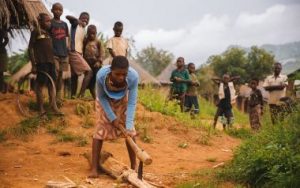Blog post by
More than 20 million young people aged 15-24 join the workforce in Africa south of the Sahara every year. These young job seekers will need to find work in today’s more competitive global economy, and not everyone thinks they will be successful.
Many governments are concerned about the prospect of widespread youth unemployment and the political unrest that this “youth bulge” could bring. Concerns are perhaps greatest for rural Africa, where global poverty is concentrating and job opportunities beyond smallholder farming are few and far between.
Although creating enough jobs in Africa is a daunting challenge, there are reasons for optimism. Many people highlight the fact that younger Africans are generally better educated than older generations and are often more comfortable with new technologies.
Young people may be better equipped to use modern farming practices, start new businesses in rural areas, or take advantage of opportunities in Africa’s growing cities.
In short, many people think young job seekers could be the “agents of change” that rural Africa sorely needs.
It turns out, though, that the concerns and optimism about African youth is not well grounded in evidence. In our new book, Youth and Jobs in Rural Africa, we revisit the so-called facts that underpin much of our understanding about the prospects of African youth.
A more careful look at the data reveals that Africa does not have a “youth problem,” but rather faces the broader challenge of promoting inclusive economic development. Moreover, while young people are better educated, this is no guarantee that they will be in the vanguard of rural development.
We compare Africa’s youth bulge to those of other developing regions and find that, while Africa’s youth bulge is late, its scale is not unprecedented. The share of youth in Africa’s workforce today is similar to what it was in other regions back in the 1970s and 1980s.
Africa’s economic performance today is also, by some measures, better than it was in other regions back when their youth populations peaked. This should make us more hopeful about Africa’s ability to address its own demographic transition. Read more.
